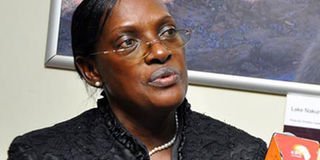Police shouldn’t summon journalists over Bagyenda

Ms Justine Bagyenda, the executive director for banks supervision at Bank of Uganda. FILE PHOTO
What you need to know:
- Our view: Ms Bagyenda, given her means and station in life, can hire a lawyer and sue the publications if she feels they defamed her or invaded her privacy.
- Our view: She will only report a case of alleged criminal defamation to the police to intimidate the media into silence.
Daily Monitor reported yesterday that seven journalists who operate online publications have been summoned by the police to answer questions related to stories they published basing on details of leaked bank account details of Ms Justine Bagyenda, the executive director for banks supervision at Bank of Uganda.
Those summoned to appear at the CID headquarters for questioning next week are Giles Muhame of ChimpReports, Richard Wanambwa of Eagle Online, Deo Senono of Business Focus, Darius Mugisha of Matooke Republic, Andrew Irumba of Spy Uganda and John Njoroge of CEO Magazine.
Ms Bagyenda came under fire after Bank of Uganda took over the management of Crane Bank earlier this year over allegations of mismanagement and later sold it Dfcu Bank. Those who spoke out in defence of Crane Bank argued that part of the problem was that it was poorly supervised by Bank of Uganda.
As the officer in charge of banks supervision, Ms Bagyenda became a subject of interest to the press, and the online publications in question took interest in the leaked bank details that depicted Ms Bagyenda as very rich.
When the account details were published, Ms Bagyenda did not argue that the monies ascribed to her are not hers; she only argued that it was invasion of her privacy for the publications to publish the details of the bank accounts. The concerned banks reacted by reprimanding or vowing to reprimand the employees they suspected to have leaked the details.
In publishing the leaked bank details, the online publications did not make it clear whether Ms Bagyenda’s alleged bank balances tallied with what she had declared with the Inspectorate of Government (IGG). But it is also hard to tell since wealth declarations to the IGG are also kept a secret.
The argument may be that Ms Bagyenda may need to explain how she amassed the monies in question since any public officer earning her salary would realistically not amass it. Does she run any businesses, for example?
So without going into the details of whatever may have motivated the publications to write as they did, it is important that Uganda Police Force does not lend credence to accusations that it is keen to gag the media.
Ms Bagyenda, given her means and station in life, can hire a lawyer and sue the publications if she feels they defamed her or invaded her privacy. Our considered view is that she will only report a case of alleged criminal defamation to the police to intimidate the media into silence.




